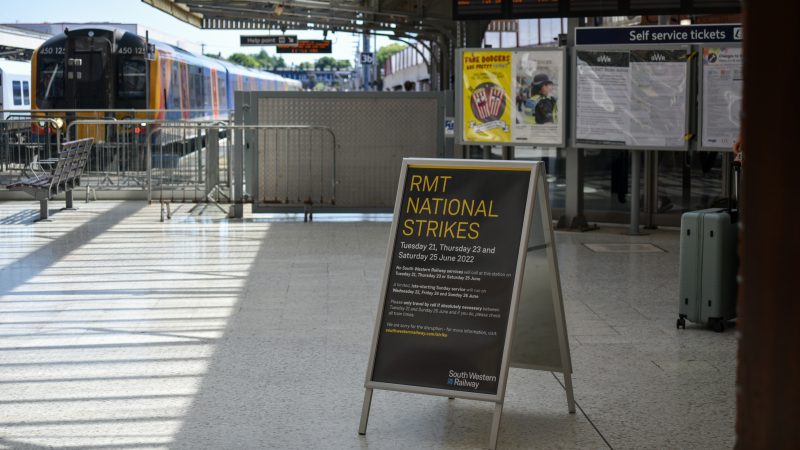
The National Union of Rail, Maritime and Transport Workers (RMT) has announced a series of 48 hour strikes in December and January after negotiations with industry failed to reach an improved settlement.
The RMT announced today that more than 40,000 members across Network Rail and 14 train operating companies will take strike action on December 13th, 14th, 16th and 17th and on January 3rd, 4th, 6th and 7th.
The union said there would also be an overtime ban across the railways from December 18th until January 2nd, meaning its members will be taking industrial action for 4 weeks.
The RMT alleged that the government is “directly interfering with our attempts to reach a settlement”. General secretary Mick Lynch declared that it had been impossible to reach an agreement with the “dead hand” of the government “presiding over these talks”.
The union announced earlier this month that it was cancelling a series of strikes due to take place on November 5th, 7th and 9th and was entering “a period of intensive negotiations” with Network Rail and rail operators. But it said today Network Rail had failed to make an “improved offer on jobs, pay and conditions”.
Lynch said: “This latest round of strikes will show how important our members are to the running of this country and will send a clear message that we want a good deal on job security, pay and conditions for our people.
“We have been reasonable, but it is impossible to find a negotiated settlement when the dead hand of government is presiding over these talks.
“The employers are in disarray and saying different things to different people, sometimes at the same time. This whole process has become a farce that only the new Secretary of State can resolve. When I meet him later this week, I will deliver that message.
“In the meantime, our message to the public is we are sorry to inconvenience you, but we urge you to direct your anger and frustration at the government and railway employers during this latest phase of action.
“We call upon all trades unionists in Britain to take a stand and fight for better pay and conditions in their respective industries. And we will seek to coordinate strike action and demonstrations where we can. Working people across our class need a pay rise, and we are determined to win that for our members in RMT.”
The Rail Delivery Group (RDG) – which represents train companies – claimed that “real progress” had been made in talks over the last two weeks, adding: “For the first time in months, we can see the outline of a credible deal.” The RDG urged the RMT “to stay at the negotiating table so we can build on that progress”.
The latest strike announcement follows widespread action across the UK’s rail network over the summer. 80% of train services were stopped during three days of industrial action by RMT members in June.
Approximately one in five trains across half of the rail network were thought to have been running on July 27th after members of the RMT and the Transport Salaried Staffs’ Association (TSSA) went on strike.
Members of the train drivers’ union ASLEF will go on strike on November 26th, in a fifth day of industrial action by the union following two days of strikes over the summer and two further walkouts in early October. The union said negotiations with the industry had so far not led to a pay offer.
ASLEF general secretary Mick Whelan argued that the union has “no choice” but to take further strike action, adding: “We want the companies – which are making huge profits – to make a proper pay offer so that our members can keep up with the cost of living.”




More from LabourList
‘The hope that kills you’: Reflections from the final day in Gorton and Denton
MPs, union leaders and organisations react to ‘bruising’ Gorton and Denton result
A gory night for Labour